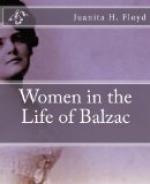Though Balzac did not go out in “society” a great deal, he was fortunate in associating with the best literary women of his time, and in knowing the charming Madame Sophie Gay, whose salon he frequented, and her three daughters. Elisa, the eldest of these, was married to Count O’Donnel. Delphine was married June 1, 1831, to Emile de Girardin, and Isaure, to Theodore Garre, son of Madame Sophie Gail, an intimate friend of Madame Gay. These two women were known as “Sophie la belle” and “Sophie la laide” or “Sophie de la parole” and “Sophie de la musique.” Together they composed an opera-comique which had some success. In 1814, Madame Gay wrote Anatole, an interesting novel which Napoleon is said to have read the last night he passed at Fontainebleau before taking pathetic farewell of his guard. A few years before this, she wrote another novel which met with much success, Leonine de Monbreuse, a study of the society and customs of the Directoire and of the Empire.
Madame Gay had made a literary center of her drawing-room in the rue Gaillon where she had grouped around her twice a week not only many of the literary and artistic celebrities of the epoch, but also her acquaintances who had occupied political situations under the Empire. Madame Gay, who had made her debut under the Directoire, had been rather prominent under the Empire, and under the Restoration took delight in condemning the government of the Bourbons. Introduced into this company, though yet unknown to fame, Balzac forcibly impressed all those who met him, and while his physique was far from charming, the intelligence of his eyes reveled his superiority. Familiar and even hilarious, he enjoyed Madame Gay’s salon especially, for here he experienced entire liberty, feeling no restraint whatever. At her receptions as in other salons of Paris, his toilet, neglected at times to the point of slovenliness, yet always displayed some distinguishing peculiarity.
Having acquired some reputation, the young novelist started to carry about with him the enormous and now celebrated cane, the first of a series of magnificent eccentricities. A quaint carriage, a groom whom he called Anchise, marvelous dinners, thirty-one waistcoats bought in one month, with the intention of bringing this number to three hundred and sixty-five, were only a few of the number of bizarre things, which astonished for a moment his feminine friends, and which he laughingly called reclame. Like many writers of this epoch, Balzac was not polished in the art of conversing. His conversation was but little more than an amusing monologue, bright and at times noisy, but uniquely filled with himself, and that which concerned him personally. The good, like the evil, was so grossly exaggerated that both lost all appearance of truth. As time went on, his financial embarrassments continually growing and his hopes of relieving them increasing in the same proportion, his future millions and his present debts were the subject of all his discourses.




